- Home
- Chuck Palahniuk
Invisible Monsters Remix
Invisible Monsters Remix Read online
P U B L I S H E R ’ S N O T E :
All type irregularities in the text are intended
ALSO BY CHUCK PALAHNIUK
Fight Club
Survivor
Choke
Lullaby
Fugitives and Refugees
Diary
Stranger Than Fiction
Haunted
Rant
Snuff
Pygmy
Tell-All
Damned
Begin Reading
The Wish Book:
A Reintroduction to Invisible Monsters
his is how old I am: I loved the Sears catalogue. It kills me that I now need to explain what that was. It was an inventory of everything you ever dreamed of owning. Imagine the entire Internet printed on paper and bound along one edge—a stack of glossy paper as thick as a telephone book. Please don’t ask me to explain what a telephone book was. By now you imagine I’m wearing a bowler hat and a celluloid collar, driving my horseless carriage, lickety-split, to a torrid three-way with Laura Ingalls Wilder and Abraham Lincoln.
As opposed to you, you who’ll always stay so young and hip.
Be that as it may. This modern world isn’t all it’s cracked up to be.
Nowadays, whatever purchase you moon over, whatever person you lust after, most likely it’s presented on a smooth glass or plastic screen. On a laptop or a television. And no matter what the technology, you’ll catch sight of your own reflection. In that electric mirror, there hovers your faint image. You’ll be superimposed over every email. Or, lurking in the glassy surface of online porn, there you are. Fewer people shut down their computers anymore, and who can blame them? The moment that monitor goes black, you’re looking at yourself, not smiling, not anything. Here’s your worst-ever passport photo enlarged to life size. Swimming behind the eBook words of Jane Austen, that slack, dead-eyed zombie face, that’s yours. That’s you.
The Sears catalogue was better. The paper reflected nothing. You could lose yourself in the Sears catalogue. The one published for the Christmas season they called the “Wish Book,” and seldom has a name been more accurate because it held hundreds of pages of toys and food and clothes, tools, and you-name-it. You could never remember it all, and every time you opened that book you found something you’d never seen before. Every time you cracked those pages you fell in love. Children and young people are always looking for an anchor, a tether, some attachment to ground them in the impossible world. The objects in the Sears catalogue baited you into adulthood. You couldn’t wait to find a job, any job, and start buying stuff. The vastness of stuff was unknowable. It was the world.
That’s how I originally structured this book: to be a little unknowable. Reader friends complained about how the dwindling number of pages, those physical sheets of paper you held between the thumb and index finger of your right hand, suggested when the plot of a novel was reaching its climax. At the time I had no washing machine. We’re talking 1991. I took my dirty clothes to a Laundromat called City Laundry every Tuesday after work. The place was cluttered with old magazines, old Vogue magazines brought in by the owner, Gretchen. They were the only reading material, and I tried reading them. The pages were seldom numbered. The pages were chockablock with artsy photos and quotes, enlarged and lifted out of context. In articles, the feature copy started near the front of the magazine but quickly “jumped” to pages near the back. Trying to read a story was like trying to navigate through a Las Vegas casino. It was designed to entice and seduce you. It was designed to trap you. I got lost. I loved it. I told myself, Why can’t a novel do this?
So that’s how I originally wrote this book. The story would not unspool as a continuous linear series of “and then, and then, and then’s . . .” At the end of the first chapter, the reader would be directed to jump to, for example, Chapter Thirty. At the end of Chapter Thirty, she’d be told to jump to Chapter Sixteen. Following the plot would mean paging forward and backward, and you’d never know where the story might end. It might all come to a head at the physical center of the book. Better yet, as you hunted for the next chapter, you’d glimpse marvelous, ridiculous scenes, and you’d wonder, “How will the story ever get there?”
Most of the book I wrote while watching music videos on MTV. Yes, that’s how old I am. Back then MTV still played videos. Now, no doubt, you picture me wearing high-button shoes and rolling a hoop down a dirt road in—I don’t know—ancient Thebes?
Nobody ever had so much fun writing a book. I’d be couch surfing with Alexander Graham Bell and Dolley Madison, watching Echo & the Bunnymen videos. Abraham Lincoln would order a pizza, and Bell would offer everyone hits of MDA. That’s how far back this happened, we didn’t call Ecstasy “E.” We didn’t even call it “X.” Louisa May Alcott would be rolling us a fatty.
I’d shake my head no. I’d whine, “Guys, I can’t get high. I need to write my novel.”
And Harriet Beecher Stowe would say, “Dude, why can’t you do both?”
You young people, you who think you invented fun and drugs and good times, fuck you.
That was my original plan for Invisible Monsters. Even after the reader reached the words “The End” she’d still sense she hadn’t read it all. The book would still hold some lingering secrets. You could open it again and find something—as with the Sears catalogue or Vogue magazine or anyone you love—something that you’d never seen before. Think D. H. Lawrence’s “Odour of Chrysanthemums” but scored with music by Bronski Beat. That’s how I originally wrote this book. It was packed with jumps. Hidden secrets. Buried treasure. I gave the original manuscript to a friend, Monica Drake, the author of Clown Girl. She read it the way she had read every other book, from beginning to end . . . page one, page two, page three . . . and then, and then, and then . . . She told me that jumping was too difficult. “Readers,” Monica warned me, “most readers, aren’t going to want to work that hard.” They’d get lost. Back then, neither Monica nor I had been published. We didn’t want to make trouble. We just wanted for people to love us.
So I hammered the story into a nice, smooth, straight line. I threw out the magic. A wonderful publisher bought the rights. It was launched in 1999 as a paperback. It’s only ever been a paperback. End of story.
Still, Harriet’s words kept echoing in my head: “Why can’t you do both?”
Twelve years later, the publisher W. W. Norton suggested producing a hardcover version of the book, and I saw my chance. The Brandy Alexander Witness Reincarnation Program. I told myself: Here we go again. Where you’re supposed to be is some big West Hills wedding reception in a big manor house with flower arrangements and stuffed mushrooms all over the house . . .
You might mark every page with a little X, like leaving a trail of bread crumbs, to make sure you read them all. Or don’t. Me, personally? I hope you get lost. I mean, really, would that be so bad?
Now, Please, Jump to Chapter Forty-one
on’t expect this to be the kind of story that goes: and then, and then, and then.
What happens here will have more of that fashion magazine feel, a Vogue or a Glamour magazine chaos with page numbers on every second or fifth or third page. Perfume cards falling out, and full-page naked women coming out of nowhere to sell you makeup.
Don’t look for a contents page, buried magazine-style twenty pages back from the front. Don’t expect to find anything right off. There isn’t a real pattern to anything, either. Stories will start and then, three paragraphs later:
Jump to page whatever.
Then, jump back.
This will be ten thousand fashion separates that mix and match to create maybe five tasteful outfits. A million trendy accessories, scarves and belts, shoes
and hats and gloves, and no real clothes to wear them with.
And you really, really need to get used to that feeling, here, on the freeway, at work, in your marriage. This is the world we live in. Just go with the prompts.
Jump back twenty years to the white house where I grew up with my father shooting Super 8 movies of my brother and me running around the yard.
Jump to present time with my folks sitting on lawn chairs at night, and watching these same Super 8 movies projected on the white side of the same white house, twenty years later. The house the same, the yard the same, the windows projected in the movies lined up just perfect with the real windows, the movie grass aligned with the real grass, and my movie-projected brother and me being toddlers and running around wild for the camera.
Jump to my big brother being all miserable and dead from the big plague of AIDS.
Jump to me being grown up and fallen in love with a police detective and moved away to become a famous supermodel.
Just remember, the same as a spectacular Vogue magazine, remember that no matter how close you follow the jumps:
Continued on page whatever.
No matter how careful you are, there’s going to be the sense you missed something, the collapsed feeling under your skin that you didn’t experience it all. There’s that fallen-heart feeling that you rushed right through the moments where you should’ve been paying attention.
Well, get used to that feeling. That’s how your whole life will feel someday.
This is all practice. None of this matters. We’re just warming up.
Jump to here and now, Brandy Alexander bleeding to death on the floor with me kneeling beside her, telling this story before here come the paramedics.
Jump backward just a few days to the living room of a rich house in Vancouver, British Columbia. The room is lined with the rococo hard candy of carved mahogany paneling with marble baseboards and marble flooring and a very sort-of curlicue carved marble fireplace. In rich houses where old rich people live, everything is just what you’d think.
The rubrum lilies in the enameled vases are real, not silk. The cream-colored drapes are silk, not polished cotton. Mahogany is not pine stained to look like mahogany. No pressed-glass chandeliers posing as cut crystal. The leather is not vinyl.
All around us are these cliques of Louis-the-Fourteenth chair-sofa-chair.
In front of us is yet another innocent real estate agent, and Brandy’s hand goes out: her wrist thick with bones and veins, the mountain range of her knuckles, her wilted fingers, her rings in their haze of marquise-cut green and red, her porcelain nails painted sparkle-pink, she says, “Charmed, I’m sure.”
If you have to start with any one detail, it has to be Brandy’s hands. Beaded with rings to make them look even bigger, Brandy’s hands are enormous. Beaded with rings, as if they could be more obvious, hands are the one part about Brandy Alexander the surgeons couldn’t change.
So Brandy doesn’t even try and hide her hands.
We’ve been in too many of this kind of house for me to count, and the realtor we meet is always smiling. This one is wearing the standard uniform, the navy blue suit with the red, white, and blue scarf around the neck. The blue heels are on her feet and the blue bag is hanging at the crook of her elbow.
The realty woman looks from Brandy Alexander’s big hand to Signore Alfa Romeo standing at Brandy’s side, and the power-blue eyes of Alfa attach themselves; those blue eyes you never see close or look away, inside those eyes is the baby or the bouquet of flowers, beautiful or vulnerable, that make a beautiful man someone safe to love.
Alfa’s just the latest in a year-long road trip of men obsessed with Brandy, and any smart woman knows a beautiful man is her best fashion accessory. The same way you’d product-model a new car or a toaster, Brandy’s hand draws a sight line through the air from her smile and big boobs to Alfa. “May I introduce,” Brandy says, “Signore Alfa Romeo, professional male consort to the Princess Brandy Alexander.”
The same way, Brandy’s hand swings from her batting eyelashes and rich hair in an invisible sight line to me.
All the realty woman is going to see are my veils, muslin and cut-work velvet, brown and red, tulle threaded with silver, layers of so much you’d think there’s nobody inside. There’s nothing about me to look at so most people don’t. It’s a look that says:
Thank you for not sharing.
“May I introduce,” Brandy says, “Miss Kay MacIsaac, personal secretary to the Princess Brandy Alexander.”
The realty woman in her blue suit with its brass Chanel buttons and the scarf tied around her neck to hide all her loose skin, she smiles at Alfa.
When nobody will look at you, you can stare a hole in them. Picking out all the little details you’d never stare long enough to get if she’d ever just return your gaze, this, this is your revenge. Through my veils, the realtor’s glowing red and gold, blurred at her edges.
“Miss MacIsaac,” Brandy says, her big hand still open toward me, “Miss MacIsaac is mute and cannot speak.”
The realty woman with her lipstick on her teeth and her powder and concealer layered in the crepe under her eyes, her prêt-à-porter teeth and machine-washable wig, she smiles at Brandy Alexander.
“And this . . .” Brandy’s big ring-beaded hand curls up to touch Brandy’s torpedo breasts.
“This . . .” Brandy’s hand curls up to touch pearls at her throat.
“This . . .” The enormous hand lifts to touch the billowing piles of auburn hair.
“And this . . .” The hand touches thick moist lips.
“This,” Brandy says, “is the Princess Brandy Alexander.”
The realty woman drops to one knee in something between a curtsy and what you’d do before an altar. Genuflecting. “This is such an honor,” she says. “I’m so sure this is the house for you. You just have to love this house.”
Icicle bitch she can be, Brandy just nods and turns back toward the front hall where we came in.
“Her Highness and Miss MacIsaac,” Alfa says, “they would like to tour the house by themselves, while you and I discuss the details.” Alfa’s little hands flutter up to explain, “. . . the transfer of funds . . . the exchange of lira for Canadian dollars.”
“Loonies,” the realty woman says.
Brandy and me and Alfa are all flash-frozen. Maybe this woman has seen through us. Maybe after the months we’ve been on the road and the dozens of big houses we’ve hit, maybe somebody has finally figured out our scam.
“Loonies,” the woman says. Again, she genuflects. “We call our dollars ‘Loonies,’” she says and jabs a hand in her blue purse. “I’ll show you. There’s a picture of a bird on them,” she says. “It’s a loon.”
Brandy and me, we turn icicle again and start walking away, back to the front hall. Back through the cliques of chair-sofa-chair, past the carved marble. Our reflections smear, dim, and squirm behind a lifetime of cigar smoke on the mahogany paneling. Back to the front hallway, I follow the Princess Brandy Alexander while Alfa’s voice fills the realtor’s blue-suited attention with questions about the angle of the morning sun into the dining room and whether the provincial government will allow a personal heliport behind the swimming pool.
Going toward the stairs is the exquisite back of Princess Brandy, a silver fox jacket draped over Brandy’s shoulders and yards of a silk brocade scarf tied around her billowing pile of Brandy Alexander auburn hair. The queen supreme’s voice and the shadow of L’Air du Temps are the invisible train behind everything that is the world of Brandy Alexander.
The billowing auburn hair piled up inside her brocade silk scarf reminds me of a bran muffin. A big cherry cupcake. This is some strawberry auburn mushroom cloud rising over a Pacific atoll.
Those princess feet are caught in two sort-of-gold lamé leg-hold traps with little gold straps and gold chains. These are the trapped-on, stilted, spike-heeled feet of gold that mount the first of about three hundred steps from the front hal
l to the second floor. Then she mounts the next step, and the next, until all of her is far enough above me to risk looking back. Only then will she turn the whole strawberry cupcake of her head. Those big torpedo, Brandy Alexander breasts silhouetted, the wordless beauty of that professional mouth in full face.
“The owner of this house,” Brandy says, “is very old and supplementing her hormones and still lives here.”
The carpet is so thick under my feet I could be climbing loose dirt. One step after another, loose and sliding and unstable. We, Brandy and Alfa and me, we’ve been speaking English as a second language so long that we’ve forgotten it is our first.
I have no native tongue.
We’re eye level with the dirty stones of a dark chandelier. On the other side of the handrail, the hallway’s gray marble floor looks as if we’ve climbed a stairway through the clouds. Step after step. Far away, Alfa’s demanding talk goes on about wine cellars, about kennels for the Russian wolfhounds. Alfa’s constant demand for the realty woman’s attention is as faint as a radio call-in show bouncing back from outer space.
“. . . the Princess Brandy Alexander,” Alfa’s warm, dark words float up, “she is probable to remove her clothes and scream like the wild horses in even the crowded restaurants . . .”
The queen supreme’s voice and the shadow of L’Air du Temps says, “Next house,” her Plumbago lips say, “Alfa will be the mute.”
“. . . your breasts,” Alfa is telling the realty woman, “you have two of the breasts of a young woman . . .”
Not one native tongue is left among us.
Jump to us being upstairs.
Jump to now anything being possible.
After the realtor is trapped by the blue eyes of Signore Alfa Romeo, jump to when the real scamming starts. The master bedroom will always be down the hallway in the direction of the best view. This master bathroom is paneled in pink mirror, every wall, even the ceiling. Princess Brandy and I are everywhere, reflected on every surface. You can see Brandy sitting on the pink counter at one side of the vanity sink, me sitting at the other side of the sink.

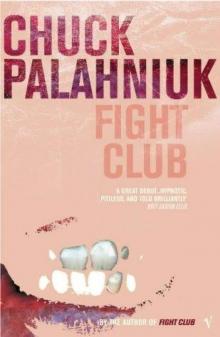 Fight Club
Fight Club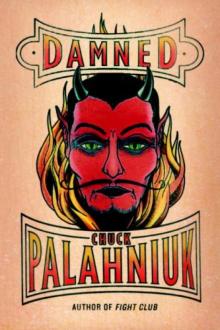 Damned
Damned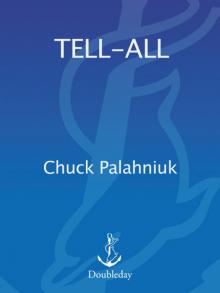 Tell-All
Tell-All Choke
Choke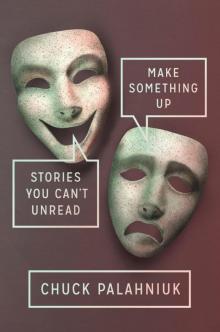 Make Something Up: Stories You Can't Unread
Make Something Up: Stories You Can't Unread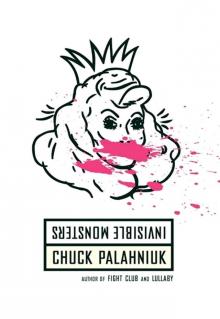 Invisible Monsters
Invisible Monsters Phoenix
Phoenix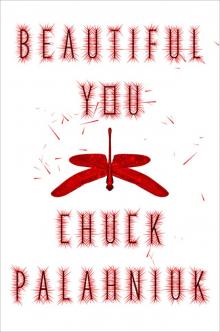 Beautiful You: A Novel
Beautiful You: A Novel Haunted
Haunted Survivor
Survivor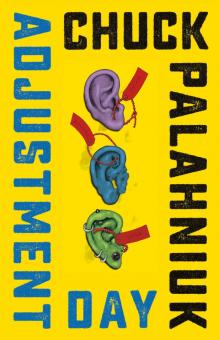 Adjustment Day
Adjustment Day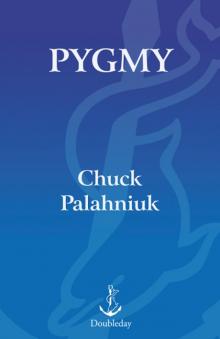 Pygmy
Pygmy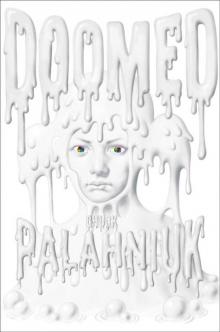 Doomed
Doomed Lullaby
Lullaby Snuff
Snuff Burnt Tongues
Burnt Tongues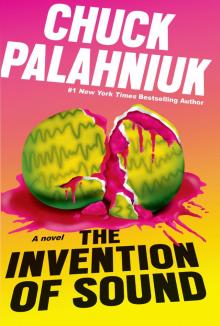 The Invention of Sound
The Invention of Sound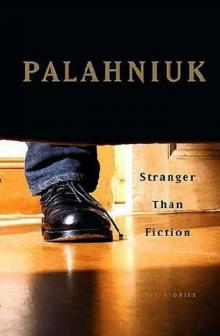 Stranger Than Fiction (True Stories)
Stranger Than Fiction (True Stories)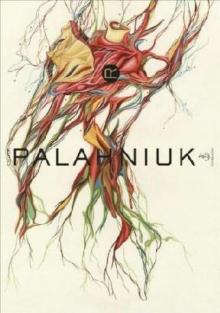 Rant: The Oral History of Buster Casey
Rant: The Oral History of Buster Casey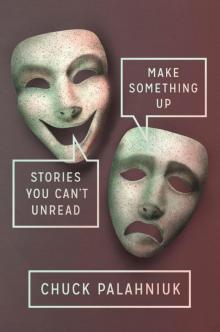 Make Something Up
Make Something Up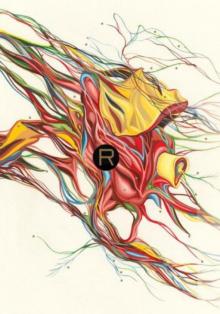 Rant: An Oral Biography of Buster Casey
Rant: An Oral Biography of Buster Casey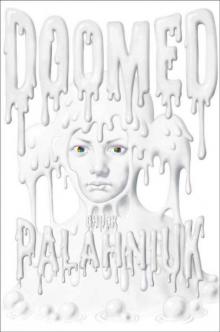 Doomed d-2
Doomed d-2 HOPE AND GORY
HOPE AND GORY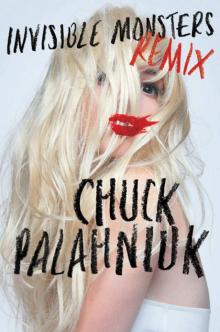 Invisible Monsters Remix
Invisible Monsters Remix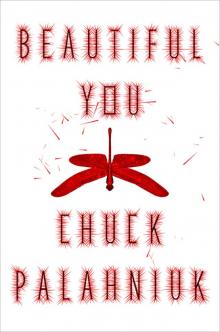 Beautiful You
Beautiful You Fugatives & Refugees
Fugatives & Refugees